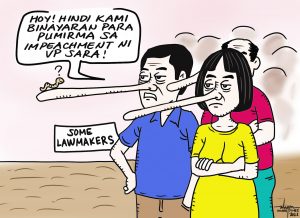Indeed the dictum that in politics “there is no permanent friends and enemies, only personal interest” is beyond arguing.
Years ago there were political families whose disdain for each other was so strong that they would not even attempt to touch one another with a ten-foot pole without resulting into fireworks. Today their actuations appear like they are the closest of friends since a long time ago.
But how long will such relationship last when it is open secret that one day soon one of their members may be running against each other on one elective position?
And this political scenario is even more manifest in the plebiscite held last Monday for the determination of the provinces, cities and municipalities that will constitute the new Bangsamoro Autonomous Region for Mindanao (BARM).
The politicians who are taking turns holding the reigns of local government units and are strongly against the BARM are of opposite factions. But for the sake of opposing the BARM they unite. Although their constituents rebuked them by voting Yes we are certain they will again be fighting each other for control of the LGUs even if these are already part of the new autonomous region.
Of course this kind of politics is not a domain of Muslim politicians. This is now common place in the May 13, 2019 midterm elections.
To know the identities of these political families just keep eyes on television ads introducing candidates for this and that elective positions. Their names are too familiar to ignore.
********************
We are not ready to believe this report and we do not also know if this is allowed under the Charter of the Philippine Health Insurance Corp. (PhilHealth).
Actually we heard about this by accident from a very close family friend from Cebu who came to Davao for vacation during the last holiday season. She stayed in our house and in one of our conversations we talked about our family members including where they are working and how much are they earning monthly.
This close family friend of ours mentioned her sister, a nurse, who works with a third level government hospital in Cebu City. We asked her how much is she receiving from that government medical institution and she answered that her sister’s monthly salary is more than P30 thousand. In addition she also gets an average of P10,000.00 a quarter from funds supposedly received by the hospital from the government’s health insurance firm.
We were almost choked upon hearing the words of our family friend. That was the first time we heard about money from PhilHealth given to a government hospital and possibly divided pro-rata by the employees. The possibility is that our family friend vacationist did not realize that she was talking to a journalist.
But as we said here earlier in this column we are not ready to believe in that story. But we know that our friend could not have told it to us if it were not also intimately shared to her.
Assuming that this arrangement is happening in Cebu we might as well inquire if giving some kind of a “rebate” or call it by whatever name, is authorized by the PhilHealth Charter. And if it is, we surmise that this is also happening in Davao City’s and Davao Region’s government hospitals. Of course, the “rebate” may also be enjoyed by the different private hospitals and clinics.
We can be certain that this treatise will generate reactions from PhilHealth and hospitals concerned. But that is exactly what we want — a clarification that can settle down our doubts.
Meanwhile, we know exactly where connivance among some PhilHealth officials, hospitals and clinics — public and private — and at different levels is prevalent. It is on the billing by these medical institutions of health services rendered supposedly covered by PhilHealth.
One example we know is that of some very minor operations like taking away of cyst on the foot or wherever this near body surface growth exists. Doctors or hospital management just demand for a minimal payment amounting to as low as P1,500 but ask the patient to fill up PhilHealth forms and sign the document. Then they tell the patient that they can go home and they (doctors, hospital, clinic management) will take care of submitting the document to the health insurance firm of the government.
How the doctors, hospital or clinic management categorize their services rendered and how much charge they are seeking for reimbursement from PhilHealth, the patient or patients involved have no way of knowing. After all. they are just too happy to be released with hardly any amount paid.
Now do not tell us how effective is the PhilHealth’s verification processes.
If such verification scheme exists, then the agency would have known some of its former officials became owners of a fully developed farms with a well-furnished houses on it. Or, is there something blinding their eyes?

